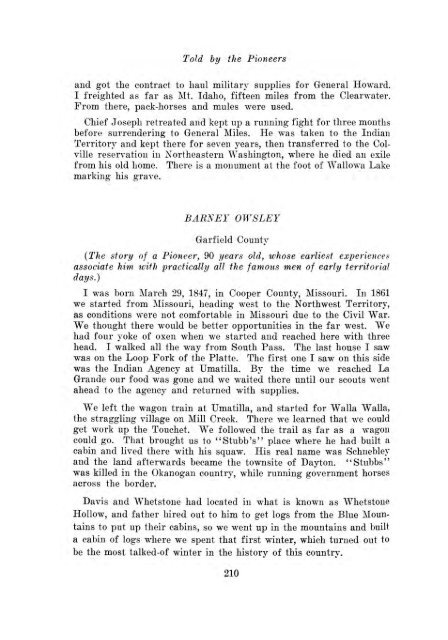Told by the Pioneers - Washington Secretary of State
Told by the Pioneers - Washington Secretary of State
Told by the Pioneers - Washington Secretary of State
You also want an ePaper? Increase the reach of your titles
YUMPU automatically turns print PDFs into web optimized ePapers that Google loves.
<strong>Told</strong><br />
<strong>by</strong> <strong>the</strong> <strong>Pioneers</strong><br />
and got <strong>the</strong> contract to haul military supplies for General Howard.<br />
I freighted as far as Mt. Idaho, fifteen miles from <strong>the</strong> Clearwater.<br />
From <strong>the</strong>re, pack-horses and mules were used.<br />
Chief Joseph retreated and kept up a running fight for three months<br />
before surrendering to General Miles. He was taken to <strong>the</strong> Indian<br />
Territory and kept <strong>the</strong>re for seven years, <strong>the</strong>n transferred to <strong>the</strong> Colville<br />
reservation in Nor<strong>the</strong>astern ""Yashington, where he died an exile<br />
from his old home. There is a monument at <strong>the</strong> foot <strong>of</strong> ~Wallowa Lake<br />
marking his grave.<br />
BARNEY OWSLEY<br />
Garfield County •<br />
(The story <strong>of</strong> a Pioneer, 90 years old, 'Whose earliest experiences<br />
associate him with lJractically all <strong>the</strong> famous men <strong>of</strong> early territorial<br />
days.)<br />
I was born March 29, 1847, in Cooper County, Missouri. In 1861<br />
we started from Missouri, heading west to <strong>the</strong> Northwest Territory,<br />
as conditions were not comfortable in Missouri due to <strong>the</strong> Civil War.<br />
We thought <strong>the</strong>re would be better opportunities in <strong>the</strong> far west. We<br />
had four yoke <strong>of</strong> oxen when we started and reached here with three<br />
head. I walked all <strong>the</strong> way from South Pass. The last house I saw<br />
was on <strong>the</strong> Loop Fork <strong>of</strong> <strong>the</strong> Platte. The first one I saw on this side<br />
was <strong>the</strong> Indian Agency at Umatilla. By <strong>the</strong> time we reached La<br />
Grande our food was gone and we waited <strong>the</strong>re until our scouts went<br />
ahead to <strong>the</strong> agency and returned with supplies.<br />
We left <strong>the</strong> wagon train at Umatilla, and started for Walla Walla,<br />
<strong>the</strong> straggling village on Mill Creek. There we learned that ~we could<br />
get work up <strong>the</strong> Touchet. We followed <strong>the</strong> trail as far as a wagon<br />
could go. That brought us to "Stubb's" place where he had built a<br />
cabin and lived <strong>the</strong>re with his squaw. His real name was Schnebley<br />
and <strong>the</strong> land afterwards became <strong>the</strong> townsite <strong>of</strong> Dayton. "Stubbs"<br />
was killed in <strong>the</strong> Okanogan country, while running government horses<br />
across <strong>the</strong> border.<br />
Davis and Whetstone had located in what is known as 'Whetstone<br />
Hollow, and fa<strong>the</strong>r hired out to him to get logs from <strong>the</strong> Blue Mountains<br />
to put up <strong>the</strong>ir cabins, so we went up in <strong>the</strong> mountains and built<br />
a cabin <strong>of</strong> logs where we spent that first winter, which turned out to<br />
be <strong>the</strong> most talked-<strong>of</strong> winter in <strong>the</strong> history <strong>of</strong> this country.<br />
210
















